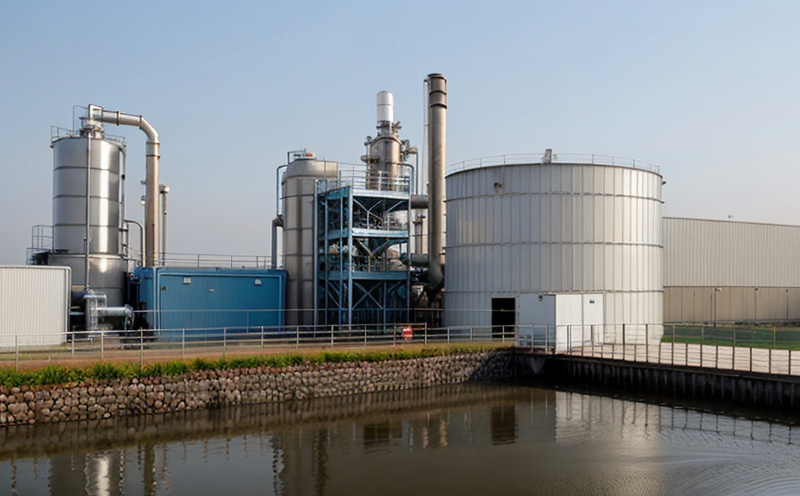ISO 16075 Water Reuse Testing in Industrial Processing
The International Organization for Standardization (ISO) standard ISO 16075-1:2016 provides a robust framework for evaluating water reuse in industrial processes. This standard is pivotal for industries that need to optimize their water usage and reduce waste, ensuring sustainable operations while adhering to stringent environmental regulations.
Water reuse in industrial processing encompasses the recycling of treated wastewater within manufacturing facilities. The goal is not only to conserve water resources but also to minimize the discharge of pollutants into external environments. This test ensures that reclaimed water meets strict quality thresholds before it is reused, thereby enhancing overall operational efficiency and sustainability.
The testing process outlined in ISO 16075-1 involves multiple stages:
- Sampling: Collecting representative samples of the wastewater to be tested.
- Pre-treatment: Ensuring that the sample is suitable for analysis by removing any particulates or contaminants that could interfere with test results.
- Analysis: Conducting chemical and physical analyses to assess parameters such as pH, conductivity, total dissolved solids (TDS), biochemical oxygen demand (BOD), and suspended matter content. Additionally, microbiological tests are conducted to ensure the water is safe for reuse within the facility.
The acceptance criteria for water reuse in industrial processing as per ISO 16075-1:2016 include compliance with specified limits for various chemical and physical parameters. These limits are designed to protect both the equipment used in the processes and the environment into which any treated wastewater might eventually be discharged.
For industries such as food & beverage, pharmaceuticals, electronics, and chemicals, water reuse is a critical aspect of their sustainability strategies. By implementing ISO 16075-1:2016 testing protocols, these organizations can achieve significant reductions in freshwater consumption while ensuring the quality and safety of their products.
The application of this standard extends beyond mere compliance; it also supports innovation within industrial processes. For instance, the insights gained from ISO 16075-1:2016 testing can inform the development of more efficient water treatment technologies and recycling systems. This, in turn, leads to operational cost savings and enhanced environmental performance.
Moreover, adherence to this standard provides a competitive edge by demonstrating a company's commitment to sustainability and regulatory compliance. In an increasingly regulated global market, such credentials are invaluable for attracting investment and maintaining a positive brand image.
Eurolab Advantages
Eurolab is uniquely positioned to offer comprehensive ISO 16075-1:2016 testing services tailored specifically for the industrial processing sector. Our team of experts ensures that every test conducted adheres strictly to international standards, providing clients with accurate and reliable results.
We leverage state-of-the-art instrumentation and methodologies to perform thorough analyses of water samples, ensuring precision in measurement and interpretation. Our facilities are equipped with advanced equipment capable of detecting even the most minute trace elements, which is crucial for meeting stringent acceptance criteria.
Our experienced staff comprises certified professionals who understand not just the technical aspects but also the broader implications of water reuse within industrial settings. This comprehensive understanding allows us to provide tailored recommendations aimed at optimizing your facility's water management practices.
Affordability is another key advantage of Eurolab's services. We offer competitive pricing without compromising on quality or service level. Our transparent cost structure ensures that clients receive clear, upfront quotes for all testing packages.
Why Choose This Test
The decision to implement ISO 16075-1:2016 water reuse testing is driven by several compelling reasons:
- Compliance with International Standards: By adhering to this standard, facilities ensure that their water reuse practices meet global benchmarks for quality and safety.
- Environmental Responsibility: Water conservation is a critical component of environmental stewardship. Reusing treated wastewater reduces the strain on natural water resources.
- Operational Efficiency: Optimizing water usage can lead to significant reductions in operational costs, making it an economically sound decision for businesses.
- Innovation and Competitive Advantage: Implementing such testing protocols can drive innovation within industrial processes, leading to the development of more efficient systems and technologies.
- Better Decision-Making: Accurate data provided by ISO 16075-1:2016 testing enables informed decision-making regarding water management strategies.
In summary, choosing this test is a proactive step towards sustainable operations and a commitment to responsible environmental practices. It provides valuable insights that can be leveraged for continuous improvement in industrial processes.
Competitive Advantage and Market Impact
The implementation of ISO 16075-1:2016 water reuse testing offers substantial benefits beyond mere compliance, contributing significantly to a company's competitive advantage in the market. Here’s how:
- Enhanced Reputation: Adhering to international standards boosts a company's reputation as a leader in sustainability and environmental responsibility.
- Achieving Regulatory Compliance: By ensuring water quality meets stringent international criteria, companies avoid potential legal issues and penalties associated with non-compliance.
- Cost Savings: Efficient use of recycled water can lead to substantial savings in operational costs, improving profitability.
- Innovation: The insights gained from testing can inspire innovation in water management strategies, leading to more efficient and sustainable processes.
- Sustained Operations: Compliance with these standards ensures that industrial facilities operate smoothly without interruptions due to environmental issues or regulatory breaches.
In today’s competitive landscape, businesses that prioritize sustainability are often favored by consumers who value eco-friendly practices. By demonstrating a commitment to water reuse through ISO 16075-1:2016 testing, companies can position themselves favorably in the market, attracting both current and potential customers.





